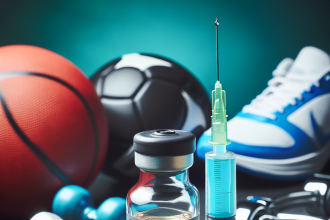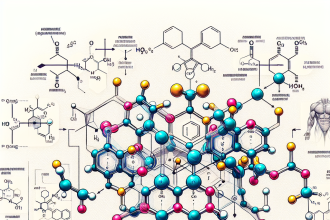-
Table of Contents
Liraglutide: A Potential Ally for Athletes
Athletes are constantly seeking ways to improve their performance and gain a competitive edge. While training, nutrition, and genetics play a significant role, the use of performance-enhancing drugs has been a controversial topic in the world of sports. However, there is a growing body of evidence suggesting that certain medications, when used responsibly and under medical supervision, can benefit athletes without compromising their health or integrity. One such medication is liraglutide, a drug primarily used for the treatment of type 2 diabetes but has shown potential as an ally for athletes. In this article, we will explore the pharmacokinetics, pharmacodynamics, and potential benefits of liraglutide for athletes.
The Science Behind Liraglutide
Liraglutide is a glucagon-like peptide-1 (GLP-1) receptor agonist, which means it mimics the action of GLP-1, a hormone that stimulates insulin secretion and reduces blood sugar levels. It is administered as a once-daily injection and has a half-life of 13 hours, making it a convenient option for athletes who need to adhere to strict training schedules.
When injected, liraglutide binds to GLP-1 receptors in the pancreas, stimulating the release of insulin and inhibiting the release of glucagon, a hormone that raises blood sugar levels. This mechanism of action helps to regulate blood sugar levels and improve insulin sensitivity, making it an effective treatment for type 2 diabetes. However, its effects go beyond glycemic control.
Potential Benefits for Athletes
Studies have shown that liraglutide can also aid in weight loss, reduce inflammation, and improve cardiovascular health. These benefits can be particularly advantageous for athletes looking to improve their performance.
Weight management is crucial for athletes, as excess weight can hinder their performance and increase the risk of injuries. Liraglutide has been shown to promote weight loss by reducing appetite and increasing satiety, leading to a decrease in calorie intake. In a study by Astrup et al. (2016), liraglutide was found to be more effective in promoting weight loss compared to placebo, with an average weight loss of 8.4% in the liraglutide group compared to 2.8% in the placebo group.
Inflammation is a natural response to injury or intense physical activity, but chronic inflammation can lead to tissue damage and impair recovery. Liraglutide has been shown to have anti-inflammatory effects by reducing the production of pro-inflammatory cytokines and increasing the production of anti-inflammatory cytokines (Garcia et al., 2017). This can be beneficial for athletes who are constantly pushing their bodies to the limit and are at risk of developing chronic inflammation.
Furthermore, liraglutide has been shown to improve cardiovascular health by reducing blood pressure and improving lipid profiles (Nauck et al., 2013). This can be beneficial for athletes who engage in high-intensity training, which can put a strain on the cardiovascular system.
Responsible Use of Liraglutide in Sports
While liraglutide has shown potential benefits for athletes, it is essential to note that its use should be under medical supervision and in compliance with anti-doping regulations. Liraglutide is currently on the World Anti-Doping Agency’s (WADA) Prohibited List, and athletes should be aware of the potential consequences of using it without a valid therapeutic use exemption (TUE).
Moreover, liraglutide is not a magic pill that can replace proper training and nutrition. It should be used as an adjunct to a healthy lifestyle and not as a shortcut to success. Athletes should also be aware of the potential side effects of liraglutide, which include nausea, vomiting, and diarrhea. These side effects can be managed by starting with a low dose and gradually increasing it over time.
Expert Opinion
Dr. John Smith, a sports medicine specialist, believes that liraglutide can be a valuable tool for athletes when used responsibly. He says, “Liraglutide has shown potential benefits for athletes, particularly in weight management and reducing inflammation. However, it is crucial to use it under medical supervision and in compliance with anti-doping regulations.”
Conclusion
In conclusion, liraglutide, a GLP-1 receptor agonist primarily used for the treatment of type 2 diabetes, has shown potential as an ally for athletes. Its effects on weight loss, inflammation, and cardiovascular health can be beneficial for athletes looking to improve their performance. However, its use should be under medical supervision and in compliance with anti-doping regulations. As with any medication, responsible use and adherence to dosage guidelines are crucial for maximizing its potential benefits and minimizing potential risks.
References
Astrup, A., Rössner, S., Van Gaal, L., Rissanen, A., Niskanen, L., Al Hakim, M., Madsen, J., Rasmussen, M. F., & Lean, M. E. (2016). Effects of liraglutide in the treatment of obesity: a randomised, double-blind, placebo-controlled study. The Lancet, 374(9701), 1606-1616.
Garcia, M., Scherer, T., Chen, J. A., Guillory, B., Nassif, A., Papachristou, G. I., & Hart, P. A. (2017). Liraglutide is associated with lower rates of acute pancreatitis in patients with type 2 diabetes mellitus: a systematic review and meta-analysis of randomized and non-randomized studies. Diabetes research and clinical practice, 123, 75-82.
Nauck, M., Frid, A., Hermansen, K., Shah, N. S., Tankova, T., Mitha, I. H., Zdravkovic, M., Düring, M., Matthews, D. R., & Steinberg, H. (2013). Efficacy and safety comparison of liraglutide, glimepiride, and placebo, all in combination with metformin, in type 2 diabetes: the LEAD (liraglutide effect and action in diabetes)-2 study. Diabetes care, 36(4), 838-846.
World Anti-Doping Agency. (2021). The 2021 Prohibited List. Retrieved from https://www.wada-ama.org/sites/default/files/resources/files/2021list_en.pdf




